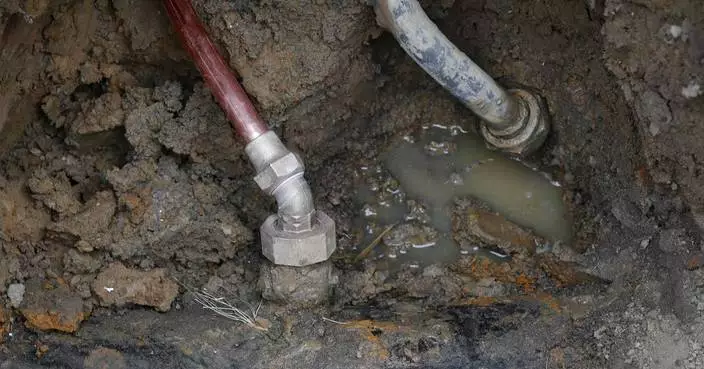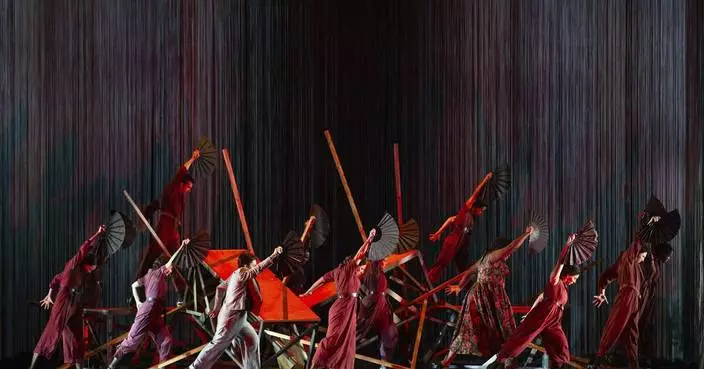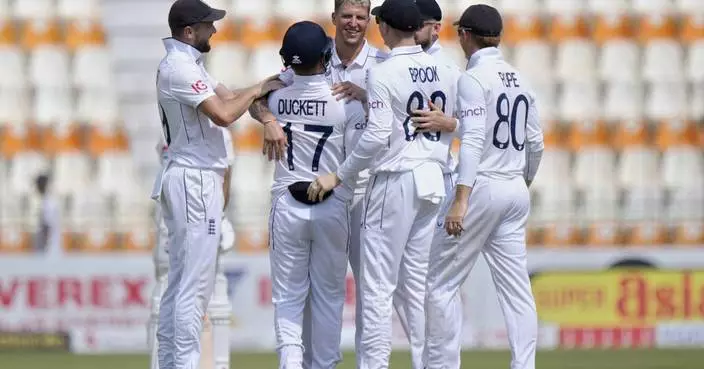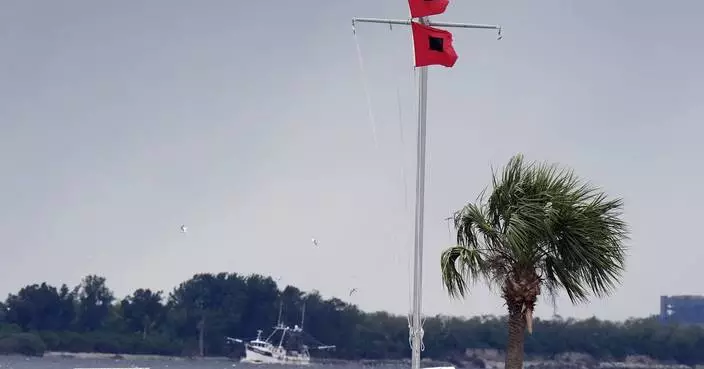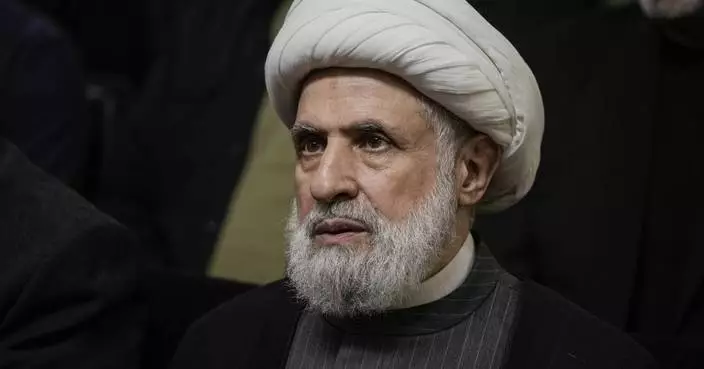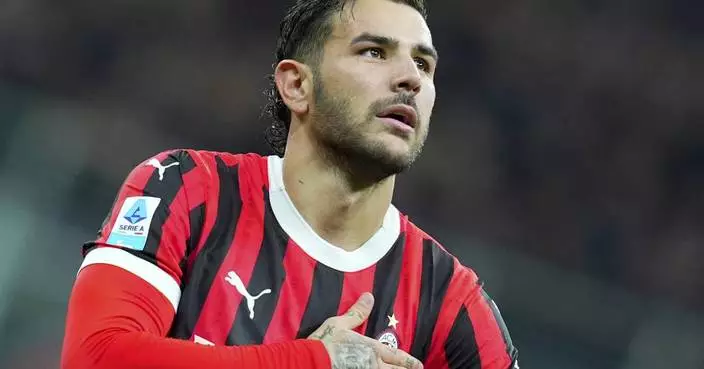STOCKHOLM (AP) — Two pioneers of artificial intelligence – John Hopfield and Geoffrey Hinton – won the Nobel Prize in physics Tuesday for helping create the building blocks of machine learning that is revolutionizing the way we work and live but also creates new threats to humanity, one of the winners said.
Hinton, who is known as the Godfather of artificial intelligence, is a citizen of Canada and Britain who works at the University of Toronto, and Hopfield is an American working at Princeton.
Click to Gallery
John Hopfield and Geoffrey Hinton, seen in picture, are awarded the 2024 Nobel Prize in Physics, announced at a press conference at the Royal Swedish Academy of Sciences in Stockholm, Sweden Tuesday Oct. 8, 2024. (Christine Olsson/TT News Agency via AP)
Professor Anders Irbäck explains the work of John Hopfield and Geoffrey Hinton after being awarded the 2024 Nobel Prize in Physics at a press conference at the Royal Swedish Academy of Sciences in Stockholm, Sweden Tuesday Oct. 8, 2024. (Christine Olsson/TT News Agency via AP)
This photo combo shows the 2024 Nobel Prize winners in Physics, professor John Hopfield, left, of Princeton University, and professor Geoffrey Hinton, of the University of Toronto, Tuesday, Oct. 8, 2024. (Princeton University via AP and Noah Berger/AP Photo)
FILE - Artificial intelligence pioneer Geoffrey Hinton poses backstage at the Collision Conference in Toronto, Wednesday, June 19, 2024. (Chris Young/The Canadian Press via AP, File)
Computer scientist Geoffrey Hinton, who studies neural networks used in artificial intelligence applications, poses at Google's Mountain View, Calif, headquarters on Wednesday, March 25, 2015. (AP Photo/Noah Berger)
FILE - Computer scientist Geoffrey Hinton, who studies neural networks used in artificial intelligence applications, poses at Google's Mountain View, Calif, headquarters on Wednesday, March 25, 2015. (AP Photo/Noah Berger, File)
File - Computer scientist Geoffrey Hinton poses at Google's Mountain View, Calif, headquarters on Wednesday, March 25, 2015. (AP Photo/Noah Berger, File)
FILE - Artificial intelligence pioneer Geoffrey Hinton speaks at the Collision Conference in Toronto, Wednesday, June 19, 2024. (Chris Young/The Canadian Press via AP, File)
John Hopfield and Geoffrey Hinton, seen in picture, are awarded this year's Nobel Prize in Physics, which is announced at a press conference by Hans Ellergren, center, permanent secretary at the Swedish Academy of Sciences in Stockholm, Sweden Tuesday Oct. 8, 2024. (Christine Olsson/TT News Agency via AP)
FILE - A close-up view of a Nobel Prize medal at the National Institutes of Health (NIH) in Bethesda, Md., Tuesday, Dec. 8, 2020. (AP Photo/Jacquelyn Martin, File)
FILE - A Nobel Prize medal is displayed before a ceremony at the Swedish Ambassador's Residence in London, Monday, Dec. 6, 2021. (AP Photo/Matt Dunham, File)
The Nobel Prize in physics is being awarded, a day after 2 Americans won the medicine prize
The Nobel Prize in physics is being awarded, a day after 2 Americans won the medicine prize
FILE - A bust of Alfred Nobel on display following a press conference at the Karolinska Institute in Stockholm, Sweden, on Monday, Oct. 3, 2022. (Henrik Montgomery/TT News Agency via AP, File)
“These two gentlemen were really the pioneers,” said Nobel physics committee member Mark Pearce. “They ... did the fundamental work, based on physical understanding which has led to the revolution we see today in machine learning and artificial intelligence.”
The artificial neural networks they pioneered are used throughout science and medicine and “have also become part of our daily lives, for instance in facial recognition and language translation," said Ellen Moons, a member of the Nobel committee at the Royal Swedish Academy of Sciences.
Hinton predicted that AI will end up having a “huge influence” on civilization, bringing improvements in productivity and health care.
“It would be comparable with the Industrial Revolution,” he said in an open call with reporters and officials of the Royal Swedish Academy of Sciences.
“Instead of exceeding people in physical strength, it’s going to exceed people in intellectual ability. We have no experience of what it’s like to have things smarter than us. And it’s going to be wonderful in many respects,” Hinton said.
“But we also have to worry about a number of possible bad consequences, particularly the threat of these things getting out of control.”
The Nobel committee that honored the science behind machine learning and AI also mentioned fears about its possible flipside. Moons said that while it has "enormous benefits, its rapid development has also raised concerns about our future. Collectively, humans carry the responsibility for using this new technology in a safe and ethical way for the greatest benefit of humankind.”
Hinton shares those concerns. He quit a role at Google so he could more freely speak about the dangers of the technology he helped create.
“I am worried that the overall consequence of this might be systems more intelligent than us that eventually take control,” Hinton said.
On Tuesday, he said he was shocked at the honor.
“I’m flabbergasted. I had, no idea this would happen,” he said when reached by the Nobel committee on the phone. He said he was at a cheap hotel with no internet.
There was no immediate reaction from Hopfield.
Hinton, now 76, in the 1980s helped develop a technique known as backpropagation that has been instrumental in training machines how to “learn" by fine-tuning errors until they disappear. It’s similar to the way a student learns from a teacher with an initial solution graded and flaws identified and returned to be fixed and repaired. This process continues until the answer matches the network’s version of reality.
His team at the University of Toronto later wowed peers by using a neural network to win the prestigious ImageNet computer vision competition in 2012. That win spawned a flurry of copycats, giving birth to the rise of modern AI.
Hinton and fellow AI scientists Yoshua Bengio and Yann LeCun won computer science’s top prize, the Turing Award, in 2019.
“For a long time, people thought what the three of us were doing was nonsense,” Hinton told The Associated Press in 2019. “They thought we were very misguided and what we were doing was a very surprising thing for apparently intelligent people to waste their time on. My message to young researchers is, don’t be put off if everyone tells you what are doing is silly.”
And Hinton himself uses machine learning in his daily life.
“Whenever I want to know the answer to anything, I just go and ask GPT4,” Hinton said at the Nobel announcement. “I don’t totally trust it because it can hallucinate, but on almost everything it's a not very good expert. And that’s very useful.”
“Twenty years ago, I think people would have happily agreed that systems with the ability of GPT-4 or (Google’s) Gemini had achieved general intelligence comparable to that of humans,” Hinton told the AP this spring. “Being able to answer more or less any question in a sensible way would have passed the test. But now that AI can do that, people want to change the test.”
Hopfield, 91, created an associative memory that can store and reconstruct images and other types of patterns in data, the Nobel committee said.
“What fascinates me most is still this question of how mind comes from machine,” Hopfield said in a video posted online by The Franklin Institute after it awarded him a physics prize in 2019.
Hinton used Hopfield's network as the foundation for a new network that uses a different method, known as the Boltzmann machine, that the committee said can learn to recognise characteristic elements in a given type of data.
Six days of Nobel announcements opened Monday with Americans Victor Ambros and Gary Ruvkun winning the medicine prize for their discovery of tiny bits of genetic material that serve as on and off switches inside cells that help control what the cells do and when they do it. If scientists can better understand how they work and how to manipulate them, it could one day lead to powerful treatments for diseases like cancer.
The physics prize carries a cash award of 11 million Swedish kronor ($1 million) from a bequest left by the award's creator, Swedish inventor Alfred Nobel. The laureates are invited to receive their awards at ceremonies on Dec. 10, the anniversary of Nobel’s death.
Nobel announcements continue with the chemistry prize on Wednesday and literature on Thursday. The Nobel Peace Prize will be announced Friday and the economics award on Oct. 14.
Corder reported from The Hague, Netherlands and Borenstein reported from Washington. Associated Press reporter Matt O'Brien contributed from Providence, Rhode Island.
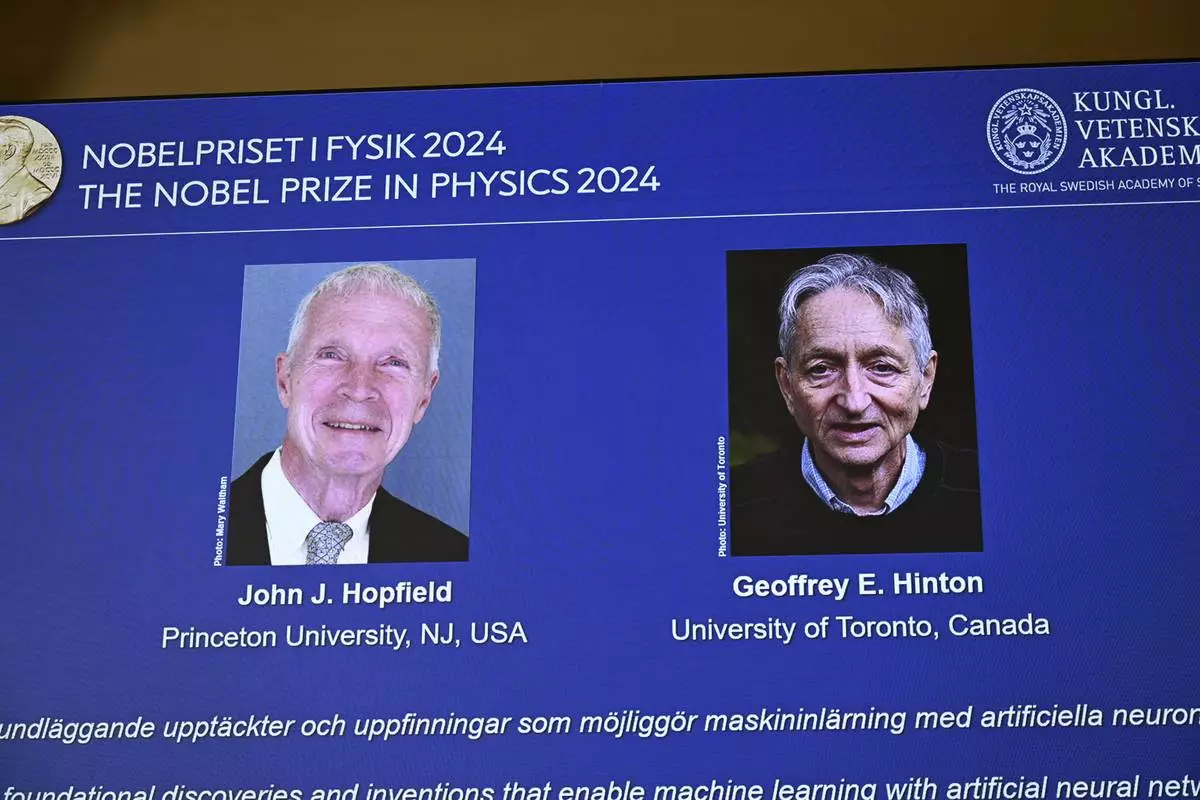
John Hopfield and Geoffrey Hinton, seen in picture, are awarded the 2024 Nobel Prize in Physics, announced at a press conference at the Royal Swedish Academy of Sciences in Stockholm, Sweden Tuesday Oct. 8, 2024. (Christine Olsson/TT News Agency via AP)
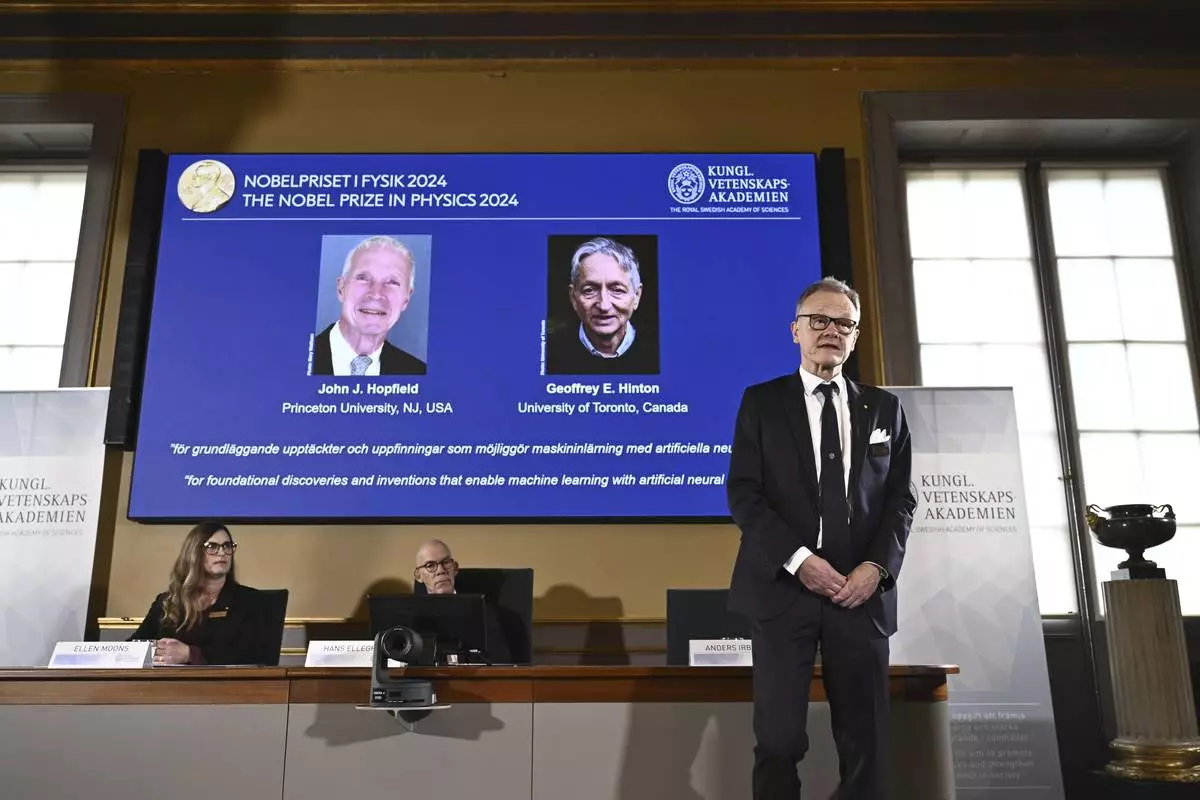
Professor Anders Irbäck explains the work of John Hopfield and Geoffrey Hinton after being awarded the 2024 Nobel Prize in Physics at a press conference at the Royal Swedish Academy of Sciences in Stockholm, Sweden Tuesday Oct. 8, 2024. (Christine Olsson/TT News Agency via AP)
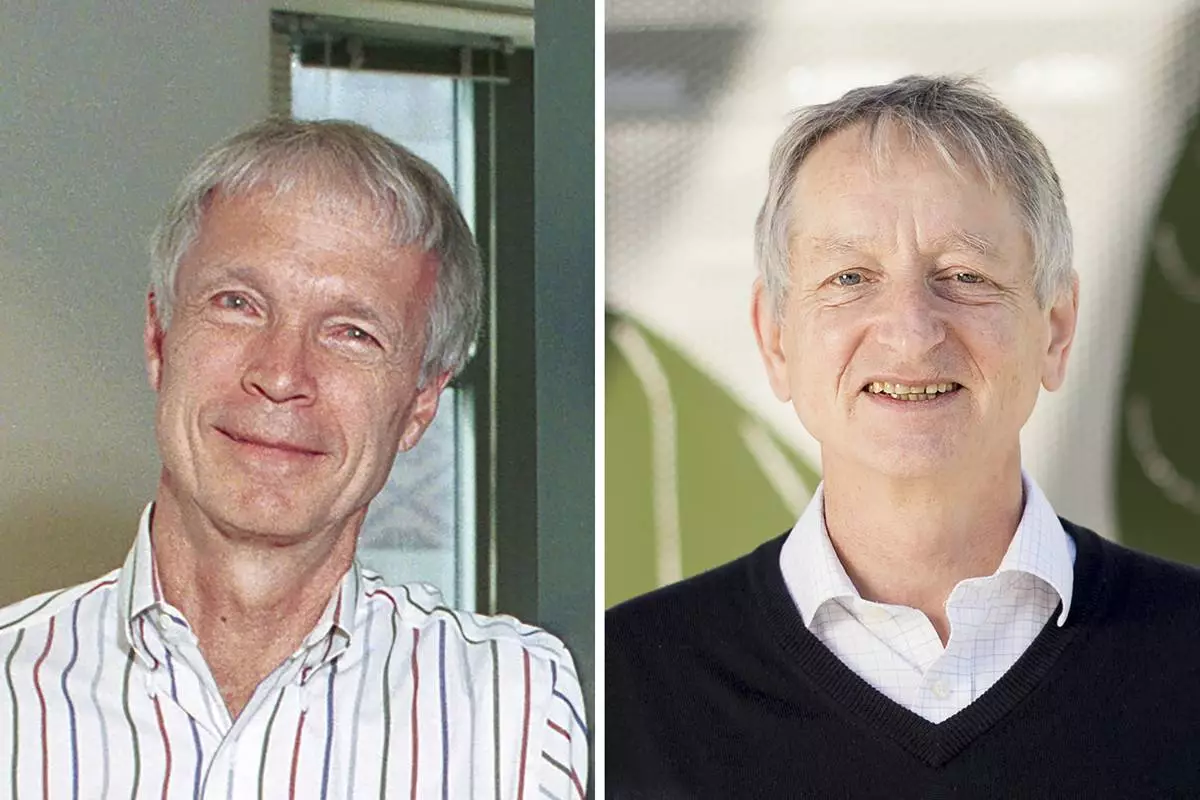
This photo combo shows the 2024 Nobel Prize winners in Physics, professor John Hopfield, left, of Princeton University, and professor Geoffrey Hinton, of the University of Toronto, Tuesday, Oct. 8, 2024. (Princeton University via AP and Noah Berger/AP Photo)
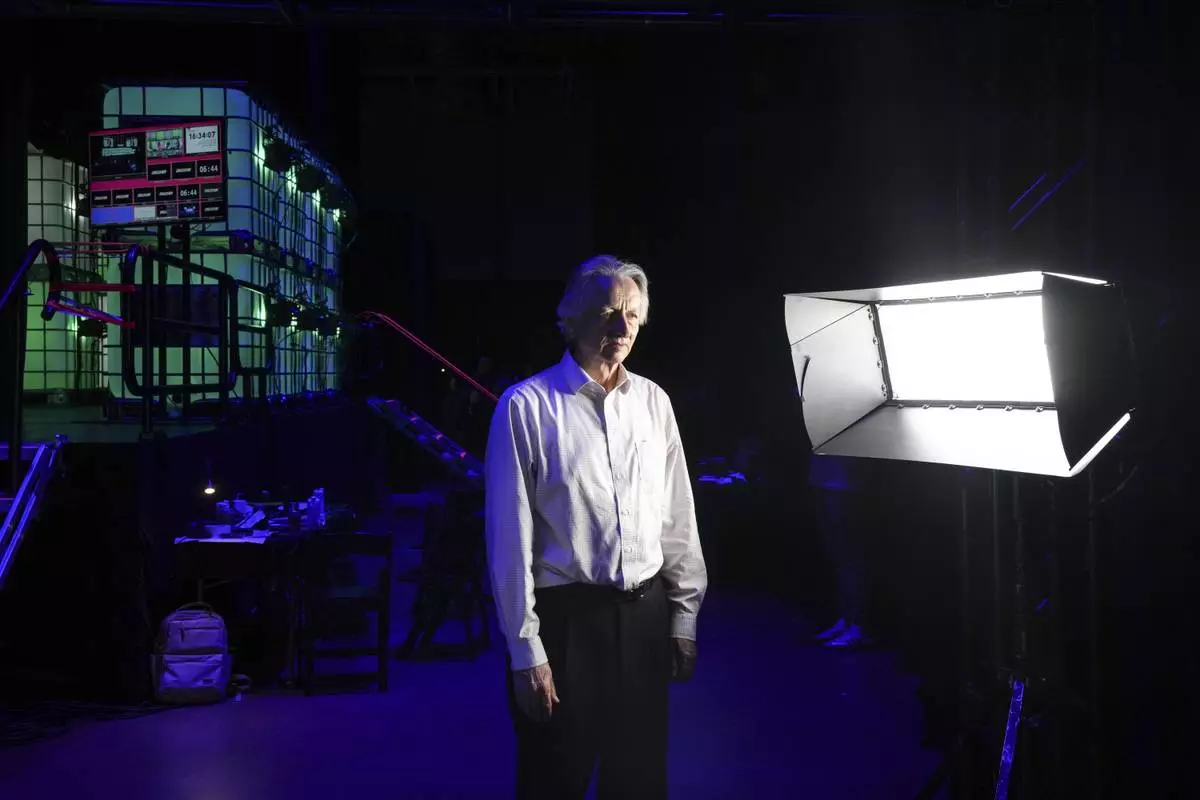
FILE - Artificial intelligence pioneer Geoffrey Hinton poses backstage at the Collision Conference in Toronto, Wednesday, June 19, 2024. (Chris Young/The Canadian Press via AP, File)
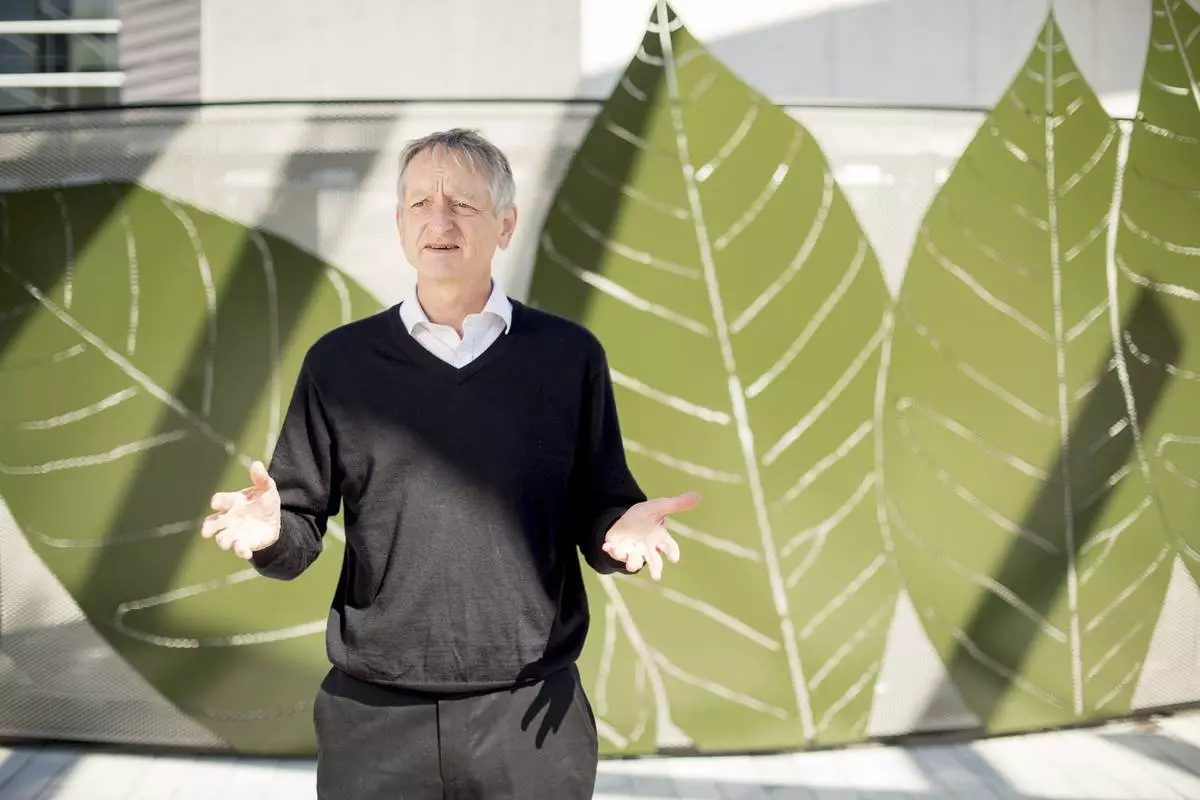
Computer scientist Geoffrey Hinton, who studies neural networks used in artificial intelligence applications, poses at Google's Mountain View, Calif, headquarters on Wednesday, March 25, 2015. (AP Photo/Noah Berger)
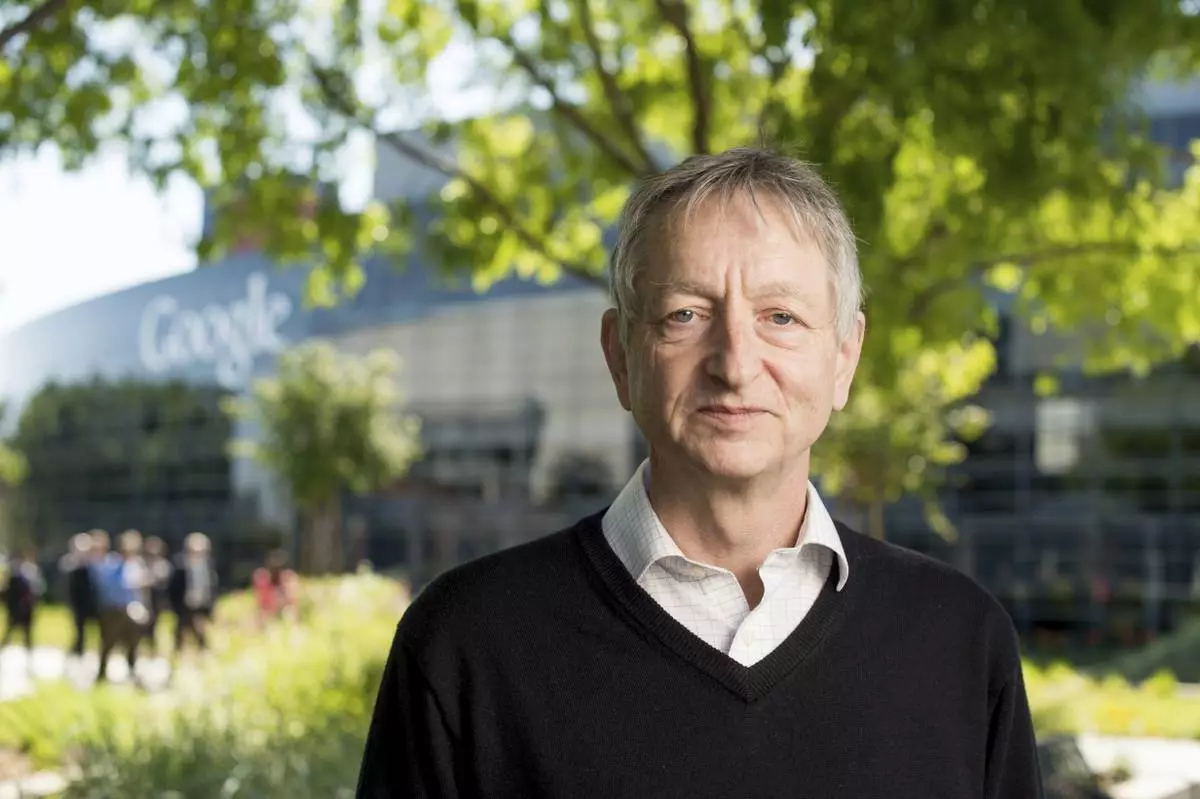
FILE - Computer scientist Geoffrey Hinton, who studies neural networks used in artificial intelligence applications, poses at Google's Mountain View, Calif, headquarters on Wednesday, March 25, 2015. (AP Photo/Noah Berger, File)
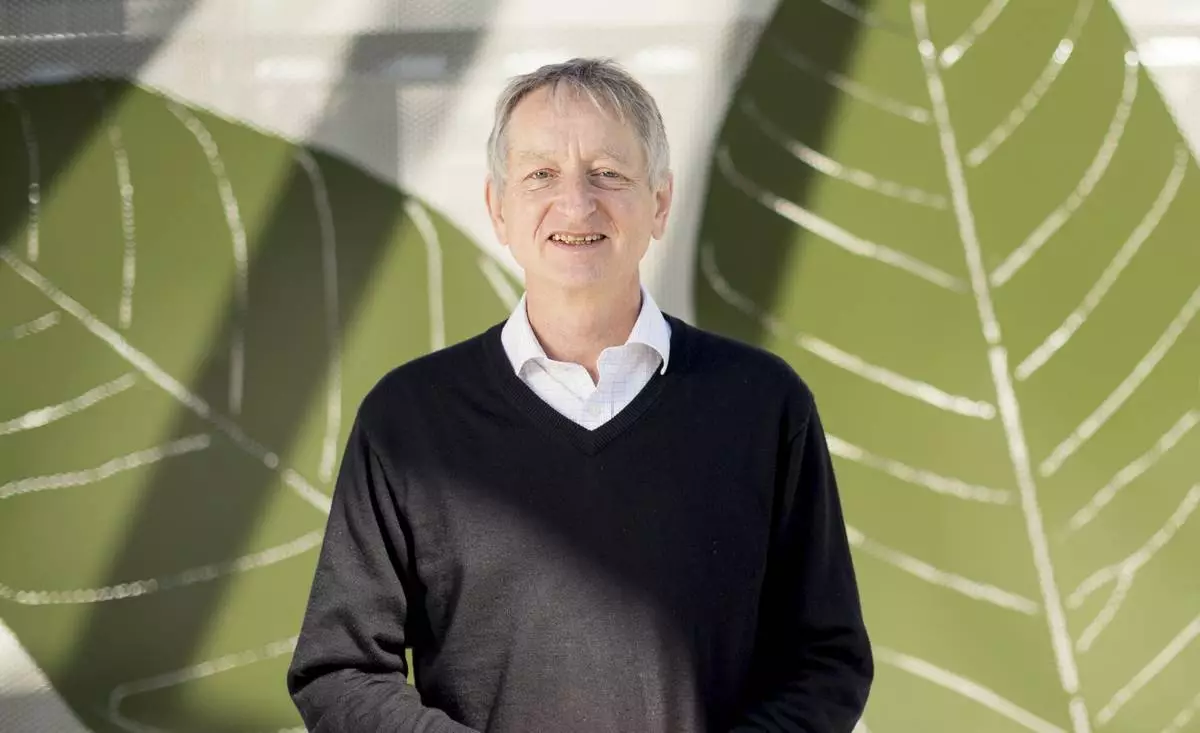
File - Computer scientist Geoffrey Hinton poses at Google's Mountain View, Calif, headquarters on Wednesday, March 25, 2015. (AP Photo/Noah Berger, File)
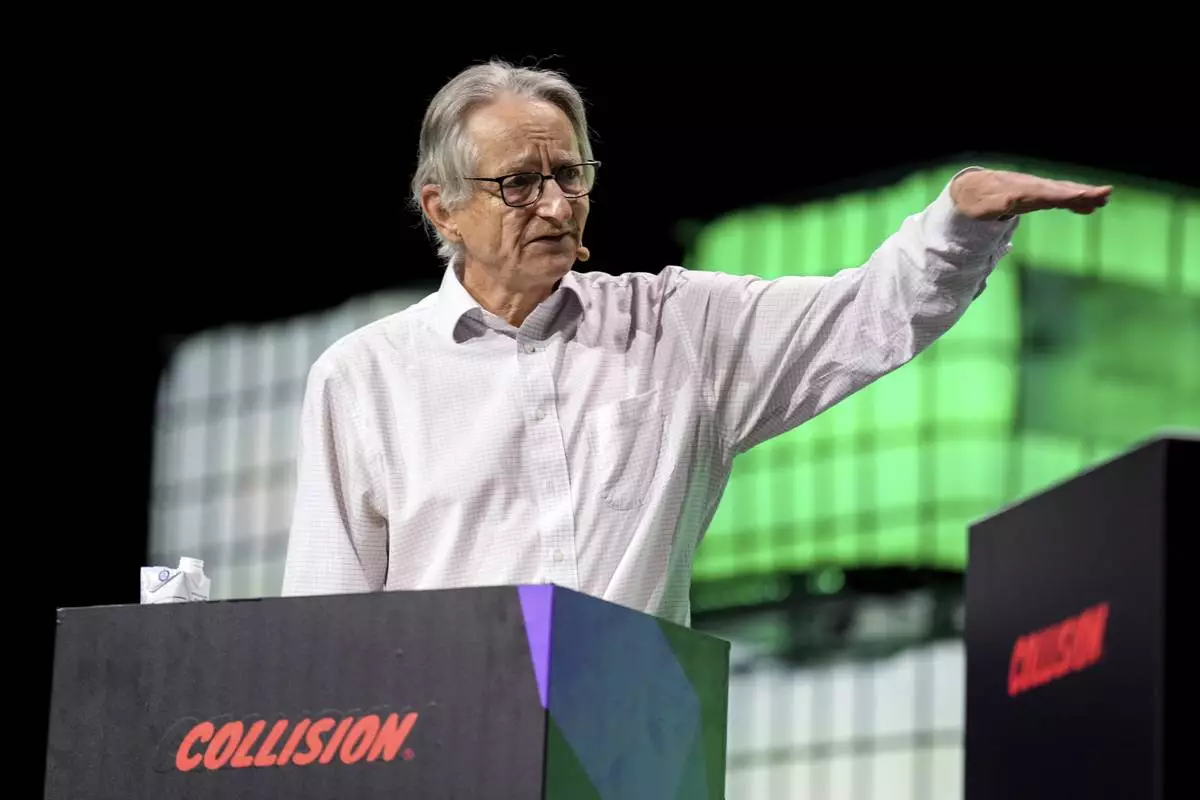
FILE - Artificial intelligence pioneer Geoffrey Hinton speaks at the Collision Conference in Toronto, Wednesday, June 19, 2024. (Chris Young/The Canadian Press via AP, File)
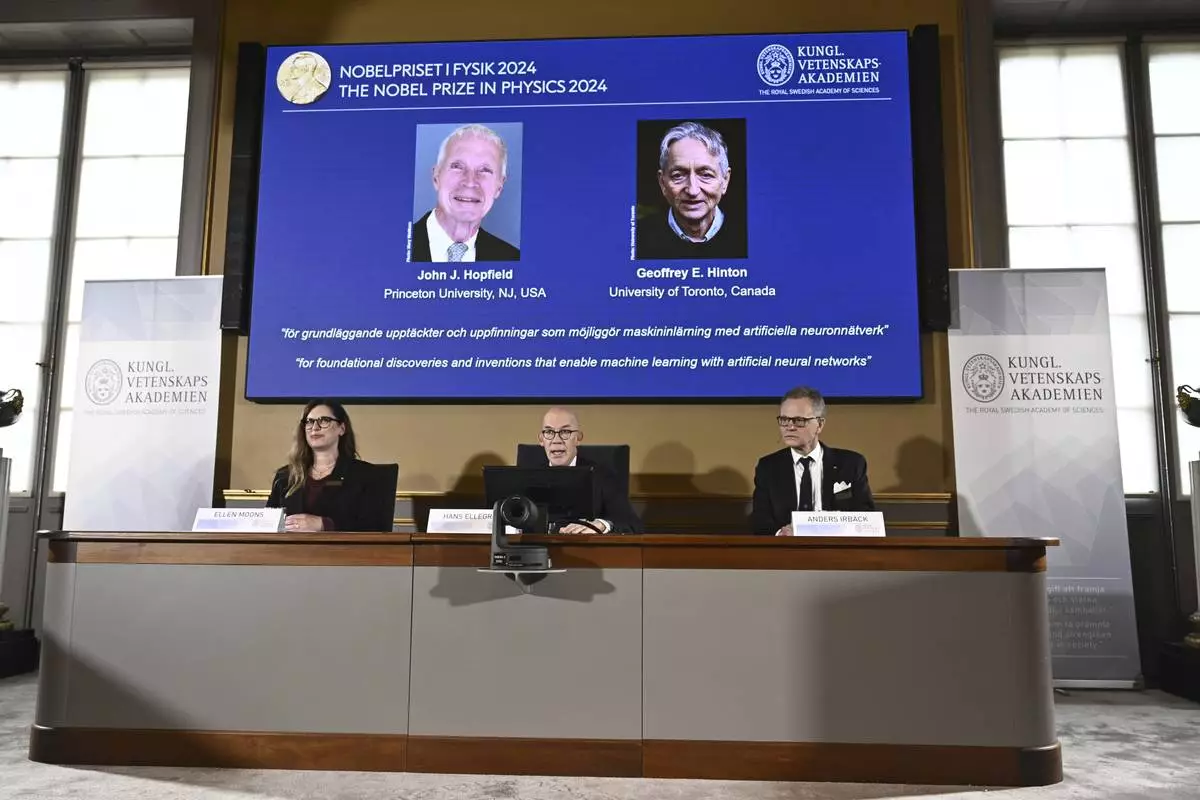
John Hopfield and Geoffrey Hinton, seen in picture, are awarded this year's Nobel Prize in Physics, which is announced at a press conference by Hans Ellergren, center, permanent secretary at the Swedish Academy of Sciences in Stockholm, Sweden Tuesday Oct. 8, 2024. (Christine Olsson/TT News Agency via AP)
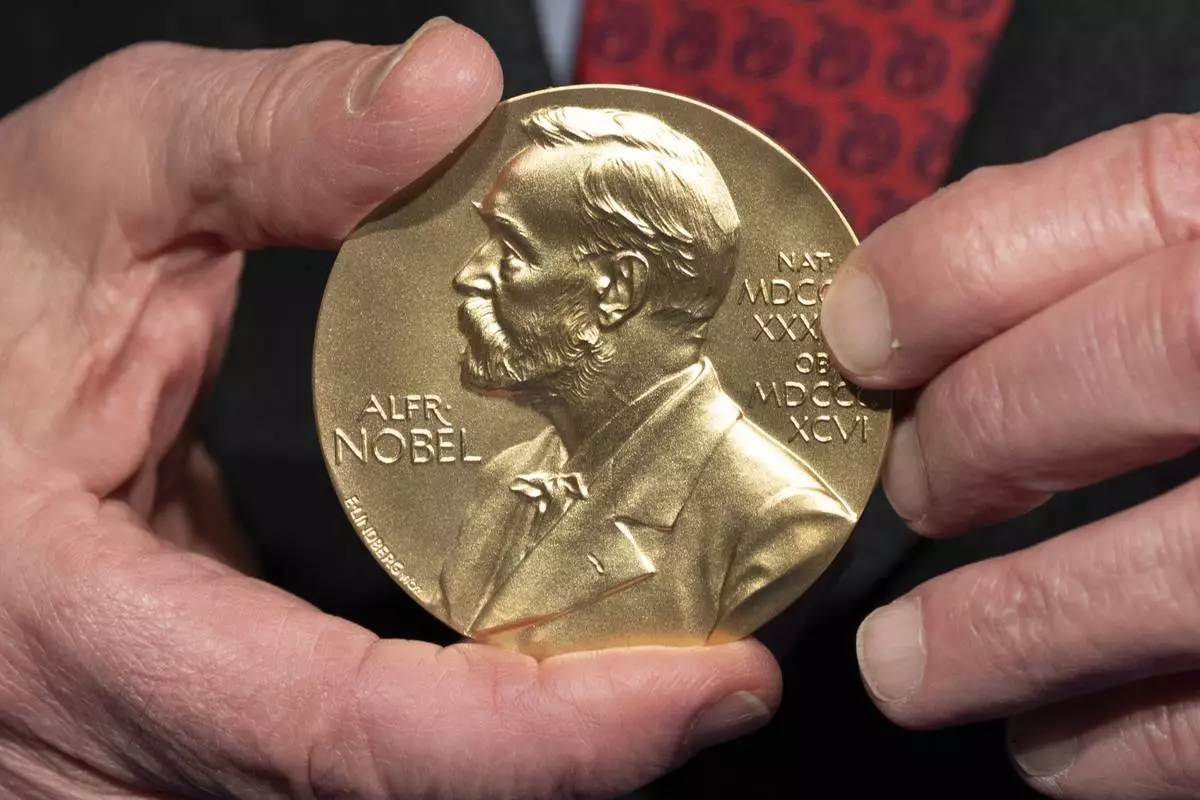
FILE - A close-up view of a Nobel Prize medal at the National Institutes of Health (NIH) in Bethesda, Md., Tuesday, Dec. 8, 2020. (AP Photo/Jacquelyn Martin, File)
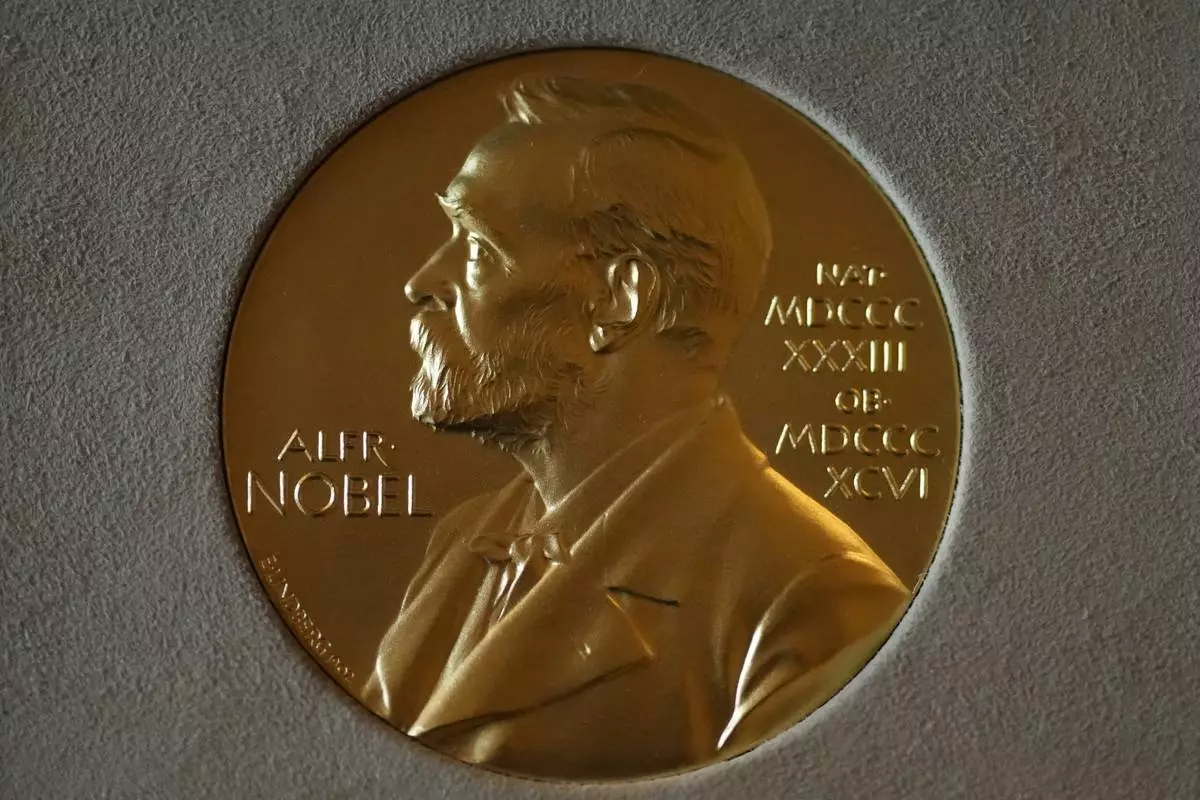
FILE - A Nobel Prize medal is displayed before a ceremony at the Swedish Ambassador's Residence in London, Monday, Dec. 6, 2021. (AP Photo/Matt Dunham, File)
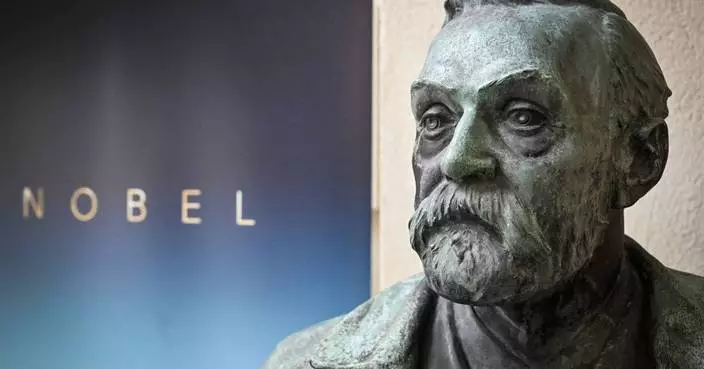
The Nobel Prize in physics is being awarded, a day after 2 Americans won the medicine prize
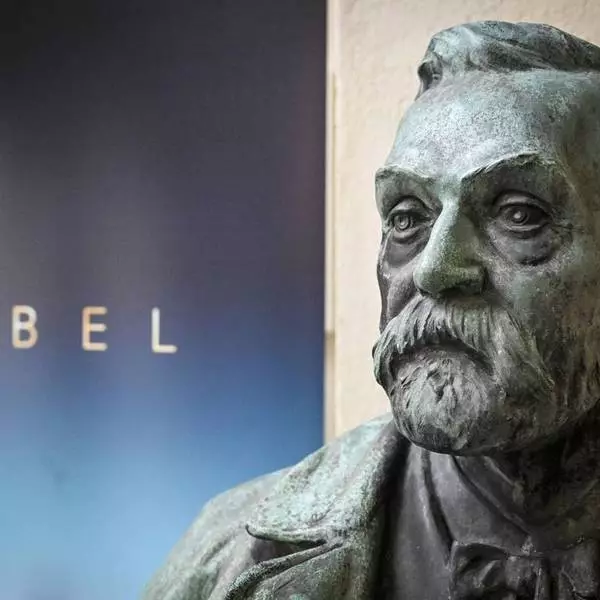
The Nobel Prize in physics is being awarded, a day after 2 Americans won the medicine prize
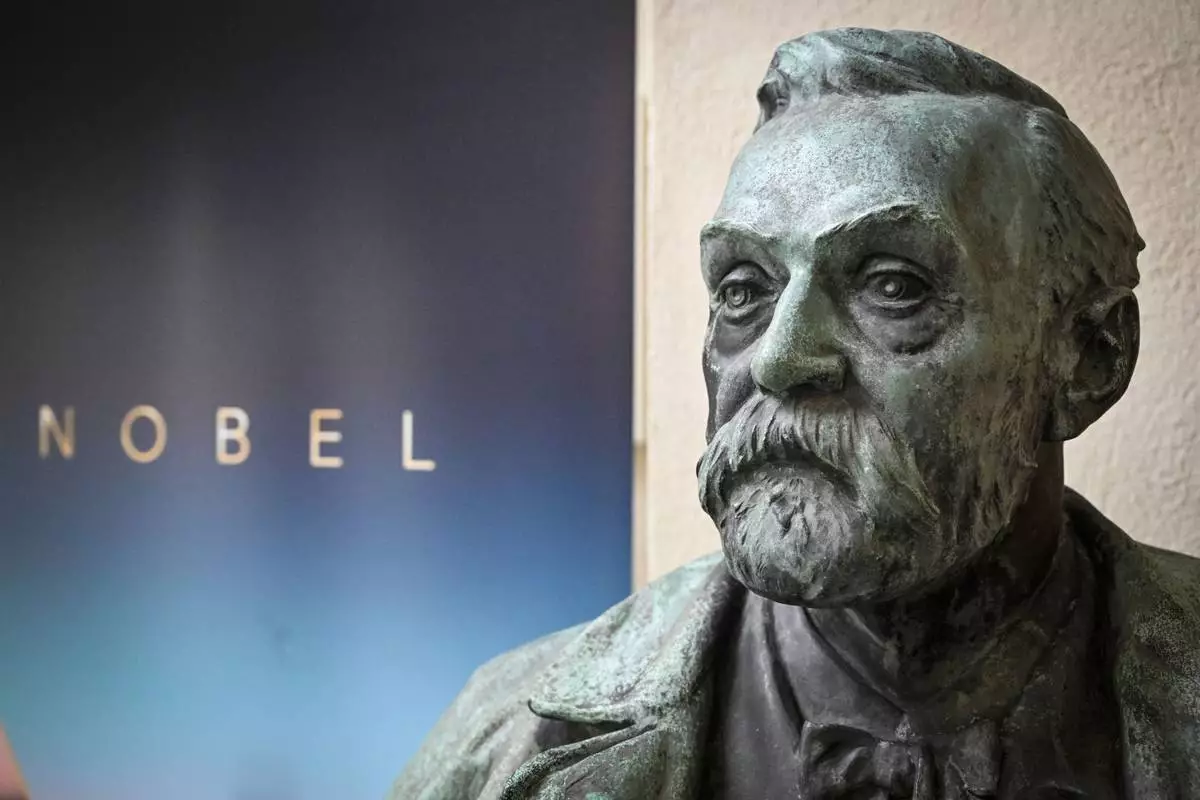
FILE - A bust of Alfred Nobel on display following a press conference at the Karolinska Institute in Stockholm, Sweden, on Monday, Oct. 3, 2022. (Henrik Montgomery/TT News Agency via AP, File)
The Israeli military said Tuesday it killed a senior Hezbollah commander in a strike on Beirut while the militant group's acting leader promised more fighting against Israeli troops in southern Lebanon and rocket fire into Israel.
The military said the strike killed Suhail Husseini, who it said was responsible for overseeing logistics, budget and management of the group. There was no immediate comment from Hezbollah.
Sheikh Naim Kassem, the acting leader of Hezbollah, said in a defiant televised statement that his group's military capabilities are still intact. He said that Hezbollah has replaced all of its senior commanders after weeks of heavy Israeli airstrikes across large parts of Lebanon, including targeted strikes that killed much of its top command in a matter of days.
Palestinian militants in Gaza fired a barrage of rockets into Israel on Monday, the anniversary of Hamas' Oct. 7 attack, underscoring their resilience in the face of a devastating Israeli offensive in Gaza that has killed about 42,000 people, according to local medical officials.
A year ago, Hamas-led militants blew holes in Israel’s security fence and stormed into army bases and farming communities, killing some 1,200 people, mostly civilians, and abducting another 250. They are still holding about 100 captives inside Gaza, a third of whom are believed to be dead.
Israel is now at war with Hamas in Gaza and its ally Hezbollah in Lebanon, which began firing rockets at Israel on Oct. 8, 2023. On Monday, Lebanon’s Health Ministry said an Israeli strike in the country’s south, part of a wider bombardment, killed at least 10 firefighters. Hezbollah fired new barrages despite its recent losses.
Here is the latest:
RIO DE JANEIRO — The second repatriation flight from Lebanon organized by the Brazilian government landed in Sao Paulo with 227 people, including 49 children, the Brazilian air force said.
On its journey to Lebanon, the plane chartered by the Brazilian air force took medical and hospital supplies donated by Brazil, the Foreign Ministry said, adding that more flights will follow.
About 21,000 Brazilians live in Lebanon, which is home to the largest community of Brazilians in the Middle East. Two Brazilian adolescents have been killed by Israeli bombardments in Lebanon.
ANKARA, Turkey — Turkey’s foreign and defense ministers are briefing lawmakers in parliament about a claim made by President Recep Tayyip Erdogan that Israel would target Turkey after Gaza and Lebanon.
The country’s main opposition party has labeled the claim as implausible but nonetheless called for the meeting, which is being held behind closed doors. These discussions are classified as state secrets and will remain confidential for 10 years.
Last week, Erdogan asserted in a speech that “the place that Israel — which is acting with the delirium of the promised lands — will set its sights on after Palestine and Lebanon will be our homeland.”
Critics say it was an attempt by Erdogan to divert attention from the country’s cost of living crisis and to consolidate nationalist and Islamist votes following a significant setback in local elections earlier this year.
BEIJING — China has evacuated more than 200 citizens from Lebanon by ship and chartered flight, the Foreign Ministry said Tuesday.
A total of 211 residents of mainland China, three Hong Kong residents and a Taiwan resident have been evacuated, according to ministry spokesperson Mao Ning.
At the request of the Lebanese government, Beijing has agreed to provide Lebanon with emergency humanitarian medical supplies, Mao added.
CAIRO — Palestinians say heavy fighting is underway in northern Gaza, where Israel has ordered another wholesale evacuation and launched a ground operation a year into the war with Hamas.
At least 15 people, including two women and four children, were killed Tuesday in the fighting in Jabaliya, the nearby Kamal Adwan Hospital said.
The Israeli military said it killed around 20 militants in airstrikes and ground fighting in Jabaliya. It said troops located a large quantity of weapons, including grenades and rifles.
The north, including Gaza City, was the first target of Israel’s ground offensive. Entire neighborhoods have been reduced to rubble and the region has been largely isolated by Israeli troops since last October, when Israel ordered everyone to leave.
Hundreds of thousands of people have remained there despite the harsh conditions, leading Israel to order another mass evacuation in recent days. Israel has prevented residents who left the north during the war from returning.
Israeli forces are battling Hamas militants in Jabaliya, home to a densely populated urban refugee camp dating back to the 1948 war surrounding Israel’s creation. Palestinian residents said Israeli warplanes and artillery were pounding Jabaliya as well as Beit Hanoun and Beit Lahiya, towns near the border.
“The situation is extremely difficult. The bombing and explosions haven’t stopped,” said Mahmoud Abu Shehatah, a Jabaliya resident. “It’s like the first days of the war.”
Israeli Prime Minister Benjamin Netanyahu has pledged “total victory” over Hamas, even as the war has expanded to include Lebanon’s Hezbollah and other Iran-backed groups across the region. Months of diplomatic efforts aimed at reaching a cease-fire in Gaza appear to have fizzled out, with each side accusing the other of making unacceptable demands.
JERUSALEM — The Israeli military said 85 projectiles were launched Tuesday from Lebanon toward northern Israel in a significant burst of fire.
The military said most of the projectiles were intercepted. Hezbollah confirmed it fired the salvo Tuesday.
Israel’s rescue service Magen David Adom said a 70-year-old woman was moderately wounded by shrapnel. Israeli media aired footage of what appeared to be minor damage to buildings near the coastal city of Haifa.
The military also said that it struck Hezbollah targets in the Beirut suburb of Dahiyeh, where the militant group has a strong presence.
BEIRUT — Hezbollah’s acting leader said Tuesday that even more Israelis will be displaced as the militant group extends its rocket fire deeper into Israel, in a defiant televised statement marking the anniversary of fighting that escalated into war last month.
Sheikh Naim Kassem said Hezbollah's military capabilities are still intact and that it has replaced all of its senior commanders after weeks of heavy Israeli airstrikes across large parts of Lebanon, including targeted strikes that killed much of its top command in a matter of days.
He also said Israeli forces have not been able to advance after launching a ground incursion into Lebanon last week. The Israeli military said a fourth division is now taking part in the incursion, which has expanded to the west, but operations still appear to be confined to a narrow strip along the border.
JERUSALEM — The Israeli military said a reserve division has begun limited operations against Hezbollah in southwestern Lebanon, in an apparent widening of its ground incursion.
The military said Tuesday that the 146th Division is the first reserve division to enter Lebanon since it launched ground operations just inside the border last week.
The announcement came a day after the Israeli military warned residents to evacuate from over a dozen towns and villages in southwestern Lebanon, including the coastal town of Naqoura, where U.N. peacekeepers are headquartered.
Israel has called on people to evacuate several dozen communities across southern Lebanon, many of them north of a U.N.-declared buffer zone established after the Israel-Hezbollah war in 2006.
Israel says its operations are aimed at halting a year of Hezbollah rocket attacks so that tens of thousands of its citizens can return to their homes in the north. Hezbollah has vowed to keep up the attacks until there is a cease-fire in Gaza.
The fighting, which escalated in mid-September, has displaced over 1 million Lebanese.
BEIRUT — The U.N. special coordinator for Lebanon and the head of the peacekeeping force deployed along the border with Israel said that a negotiated solution is the only way to restore stability and the time to act is now.
The statement by Jeanine Hennis-Plasschaert and Lt. Gen. Aroldo Lázaro of the U.N. peacekeeping force known as UNIFIL came on the first anniversary of Lebanon’s Hezbollah group starting attacks on Israeli military posts along the border in support of its Hamas allies in the Gaza Strip.
Over the past weeks, the exchanges along the border have expanded into Israeli airstrikes and Hezbollah missile attacks that are hitting deeper inside both countries. In Lebanon, more than 1 million people have been displaced and over 1,300 killed since mid-September.
Plasschaert and Lázaro said Hezbollah’s attacks starting on Oct. 8, 2023 were in violation of the U.N. Security Council resolution that ended the 34-day Israel-Hezbollah war in 2006.
“Too many lives have been lost, uprooted, and devastated, while civilians on both sides of the Blue Line are left wanting for security and stability,” the statement said referring to the border line along the Lebanon-Israel border.
“Today, one year later, the near-daily exchanges of fire have escalated into a relentless military campaign whose humanitarian impact is nothing short of catastrophic,” the statement said.
It warned that further that further violence and destruction will neither solve the underlying issues nor make anyone safer in the long run.
“A negotiated solution is the only pathway to restore the security and stability that civilians on both sides so desperately want and deserve,” the statement said. “The time to act accordingly is now.”
ANKARA, Turkey — Turkey is deploying two navy ships to evacuate its citizens from Lebanon amid the rising tensions in the region.
According to a statement from the Turkish Foreign Ministry, the ships, which together can accommodate up to 2,000 passengers, will depart for Lebanon on Tuesday. The evacuations are scheduled to begin on Wednesday.
The ministry said additional evacuations would be organized if necessary.
Besides evacuating citizens, the ships will be carrying humanitarian aid for Lebanon, the ministry said.
DEIR AL-BALAH, Gaza Strip — At least 30 people, including six children and two women, were killed in Israeli strikes in central Gaza late Monday.
Al-Aqsa Martyrs Hospital, where the bodies were taken, provided an updated toll Tuesday as more bodies were recovered from the rubble.
The strikes took place on the anniversary of Hamas’ Oct. 7 attack into southern Israel that triggered the war.
Two strikes hit houses in the built-up Bureij refugee camp, which dates back to the 1948 war surrounding Israel’s creation. An Associated Press journalist counted 21 bodies on Monday, along with about a dozen wounded, including several children.
The Palestinian death toll in the war in Gaza is nearing 42,000, according to Gaza’s Health Ministry, which doesn’t differentiate between civilians and militants.
JERUSALEM — The Israeli military says it killed a senior Hezbollah commander in a strike on Beirut.
The military said Tuesday that it killed Suhail Husseini, who it said was responsible for overseeing logistics, budget and management of the militant group.
There was no immediate comment from Hezbollah.
The military said Husseini was involved in the transfer of advanced weapons from Iran and their distribution to different Hezbollah units, and that he was a member of the group’s military council.
Israeli strikes have killed Hezbollah’s overall leader, Hassan Nasrallah, and several of his top commanders in recent weeks. Last week, Israel launched what it says is a limited ground incursion into southern Lebanon.
Hezbollah says it has already replaced its slain commanders. It has vowed to keep firing rockets, missiles and drones into Israel until there is a cease-fire in the Gaza Strip, where its ally Hamas has been at war with Israel for a year.
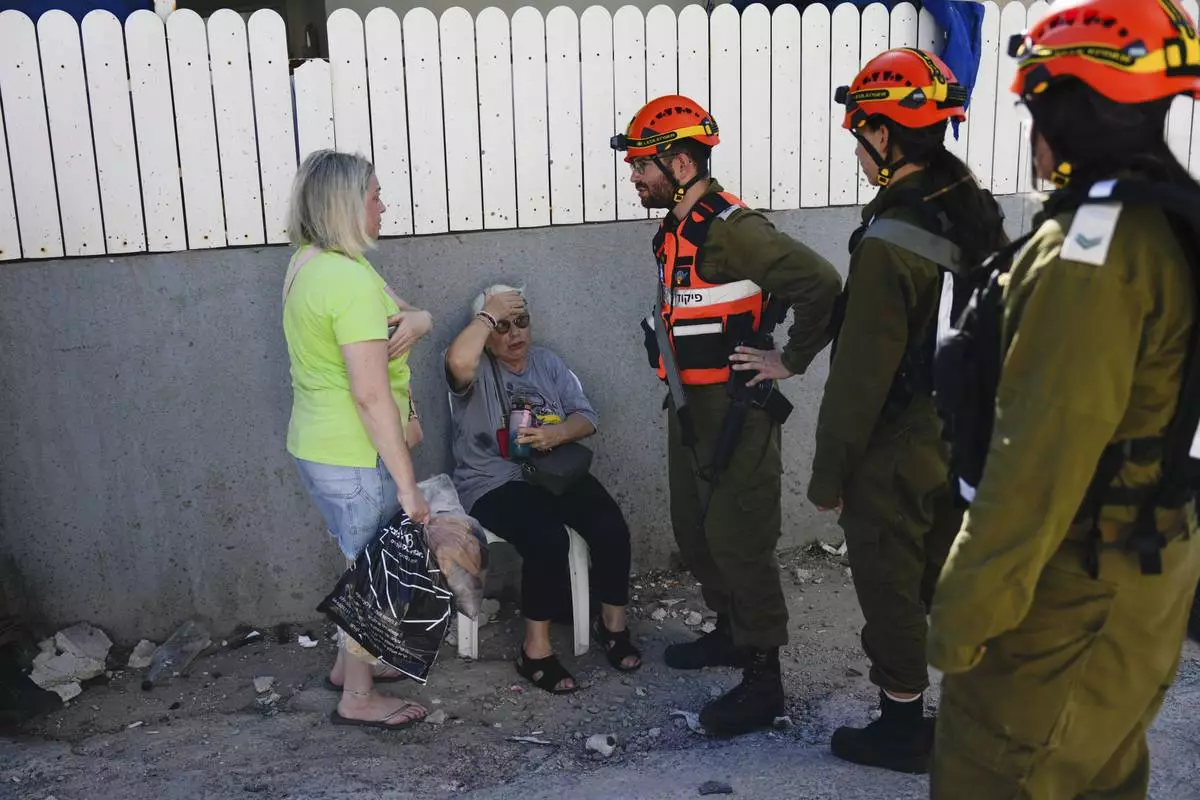
Israeli soldiers from the Homefront Command unit treat an elderly woman at the site that was hit by a rocket fired from Lebanon, in Kiryat Yam, northern Israel, on Tuesday, Oct. 8, 2024. (AP Photo/Ariel Schalit)
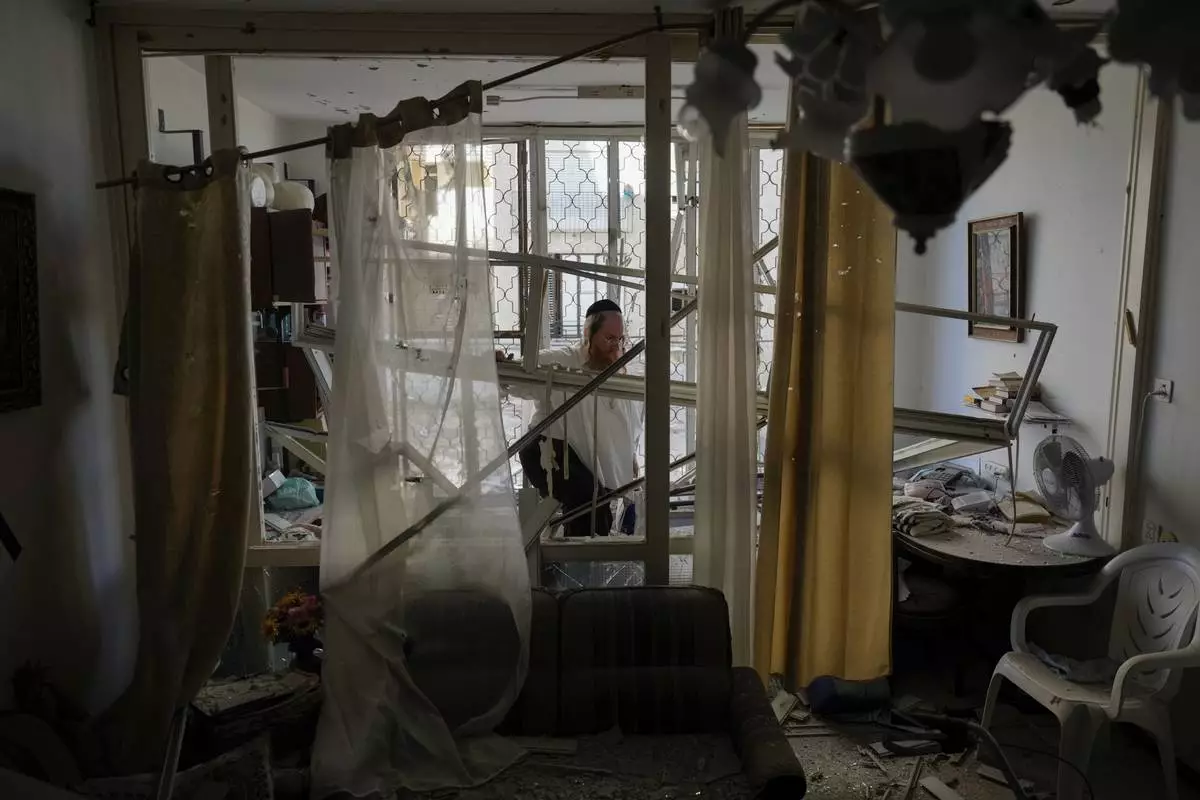
A man examine his damaged apartment that was hit by a rocket fired from Lebanon, in Kiryat Yam, northern Israel, on Tuesday, Oct. 8, 2024. (AP Photo/Ariel Schalit)
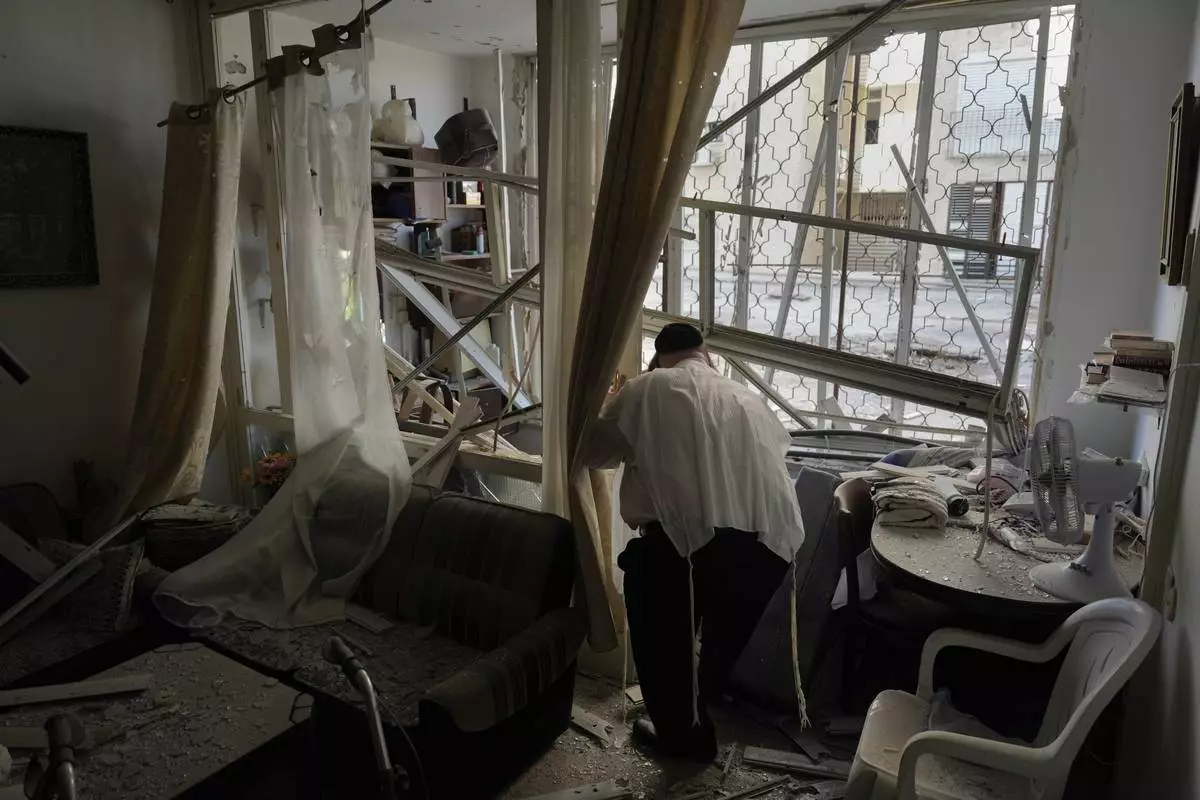
A man examine his damaged apartment that was hit by a rocket fired from Lebanon, in Kiryat Yam, northern Israel, on Tuesday, Oct. 8, 2024. (AP Photo/Ariel Schalit)
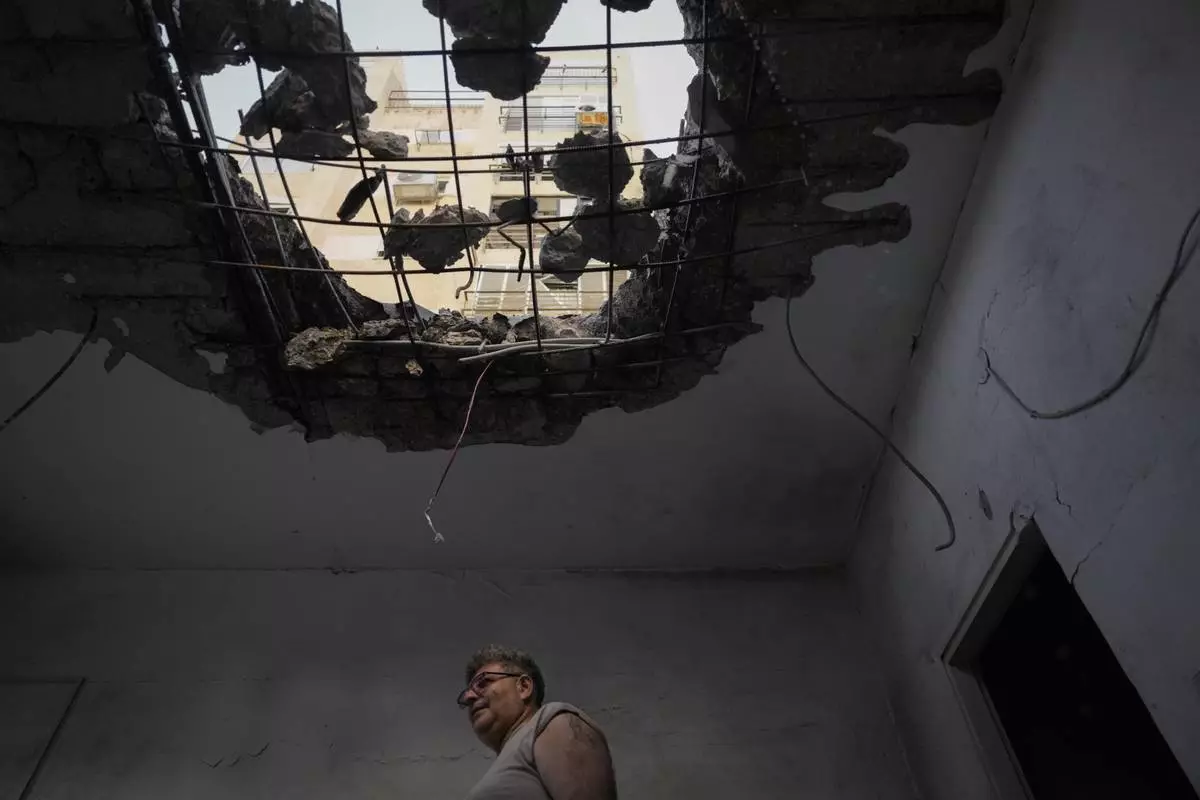
A man examine his damaged apartment that was hit by a rocket fired from Lebanon in Kiryat Yam, northern Israel, on Tuesday, Oct. 8, 2024. (AP Photo/Ariel Schalit)

Palestinians mourn their relatives killed in the Israeli bombardment of the Gaza Strip at a hospital in Deir al-Balah, Tuesday, Oct. 8, 2024. (AP Photo/Abdel Kareem Hana)
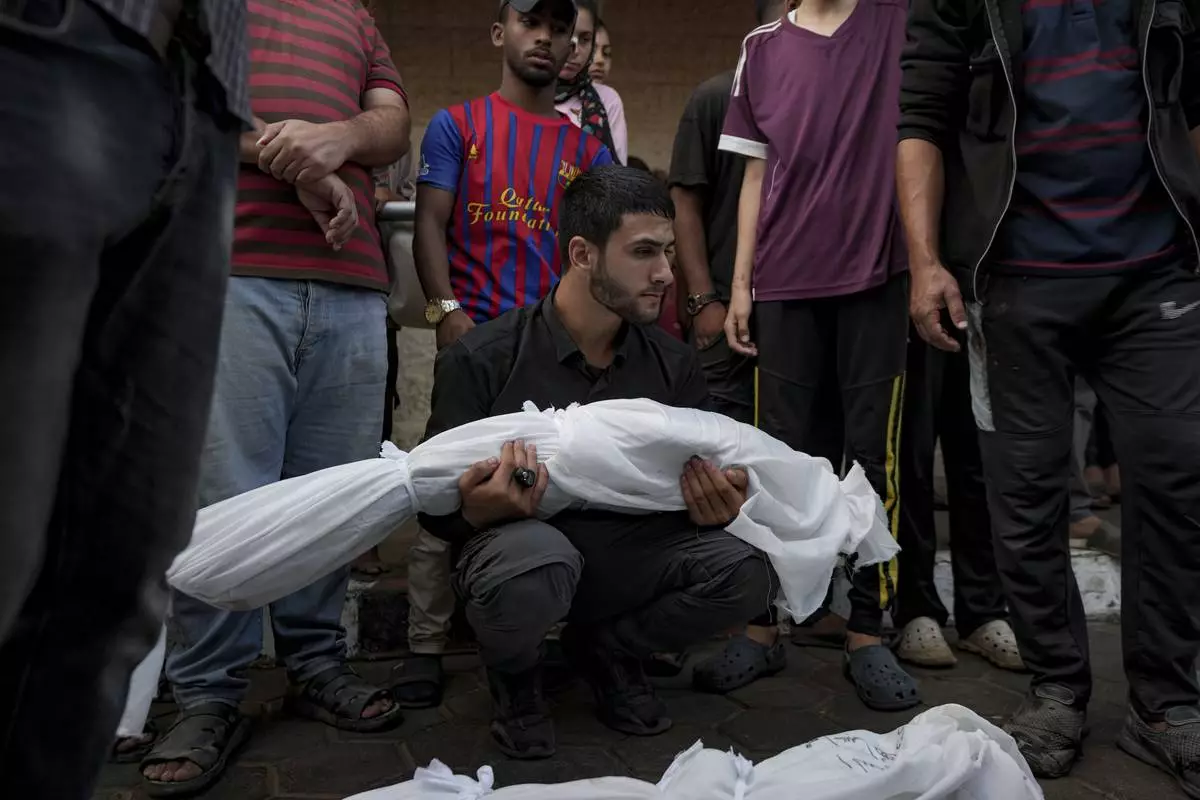
A Palestinian man holds the body of a relative killed in the Israeli bombardment of the Gaza Strip at a hospital morgue in Deir al-Balah, Tuesday, Oct. 8, 2024. (AP Photo/Abdel Kareem Hana)

Palestinians mourn a relative killed in the Israeli bombardment of the Gaza Strip at a hospital in Deir al-Balah, Tuesday, Oct. 8, 2024. (AP Photo/Abdel Kareem Hana)
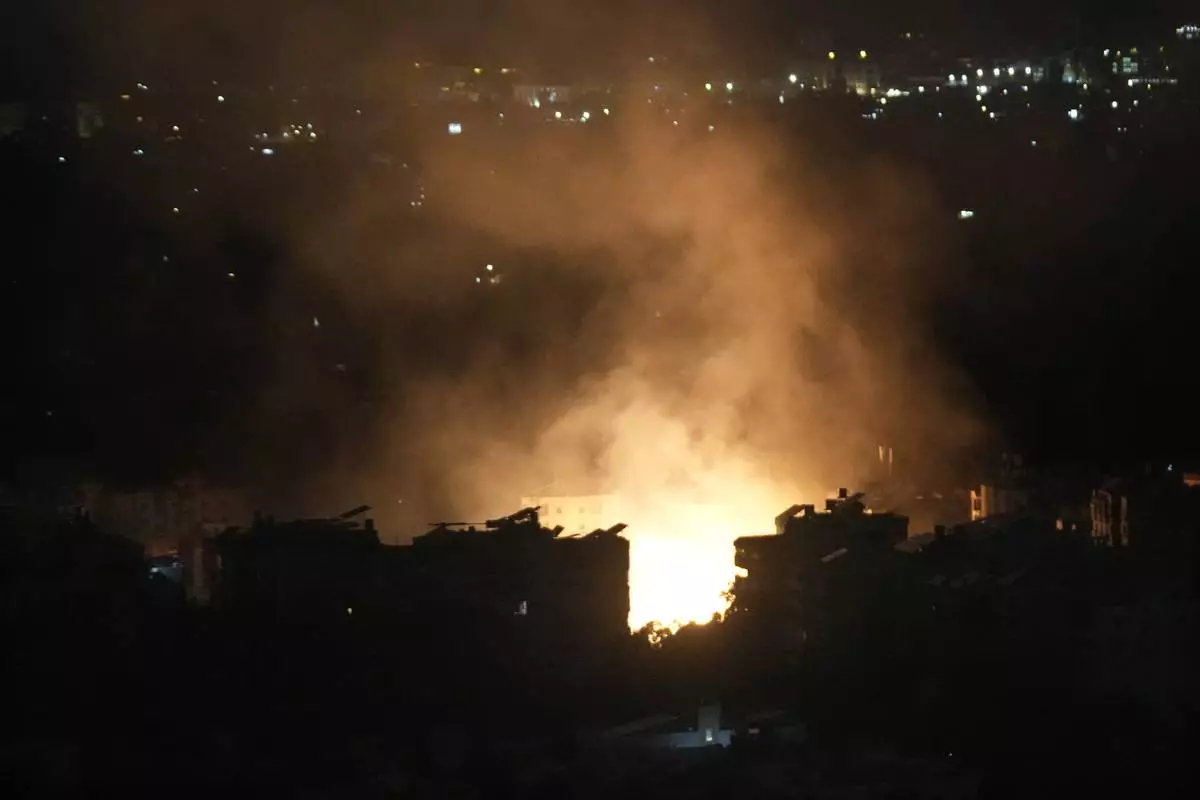
Flame and smoke rise from an Israeli airstrike in Dahiyeh, Beirut, Lebanon, Monday, Oct. 7, 2024. (AP Photo/Hussein Malla)
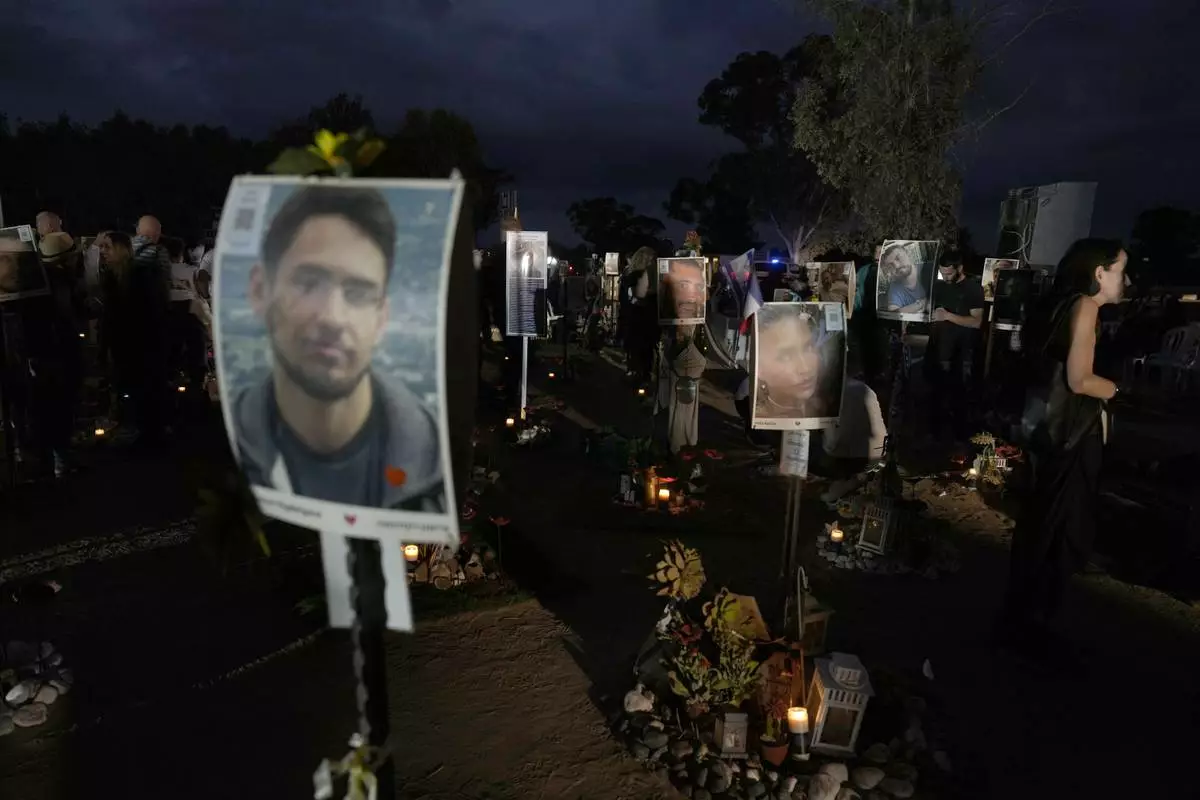
People visit the site of the Nova music festival, where hundreds of revelers were killed and abducted by Hamas and taken into Gaza, on the one-year anniversary of the attack, near Kibbutz Reim, southern Israel, Monday, Oct. 7, 2024. (AP Photo/Ariel Schalit)
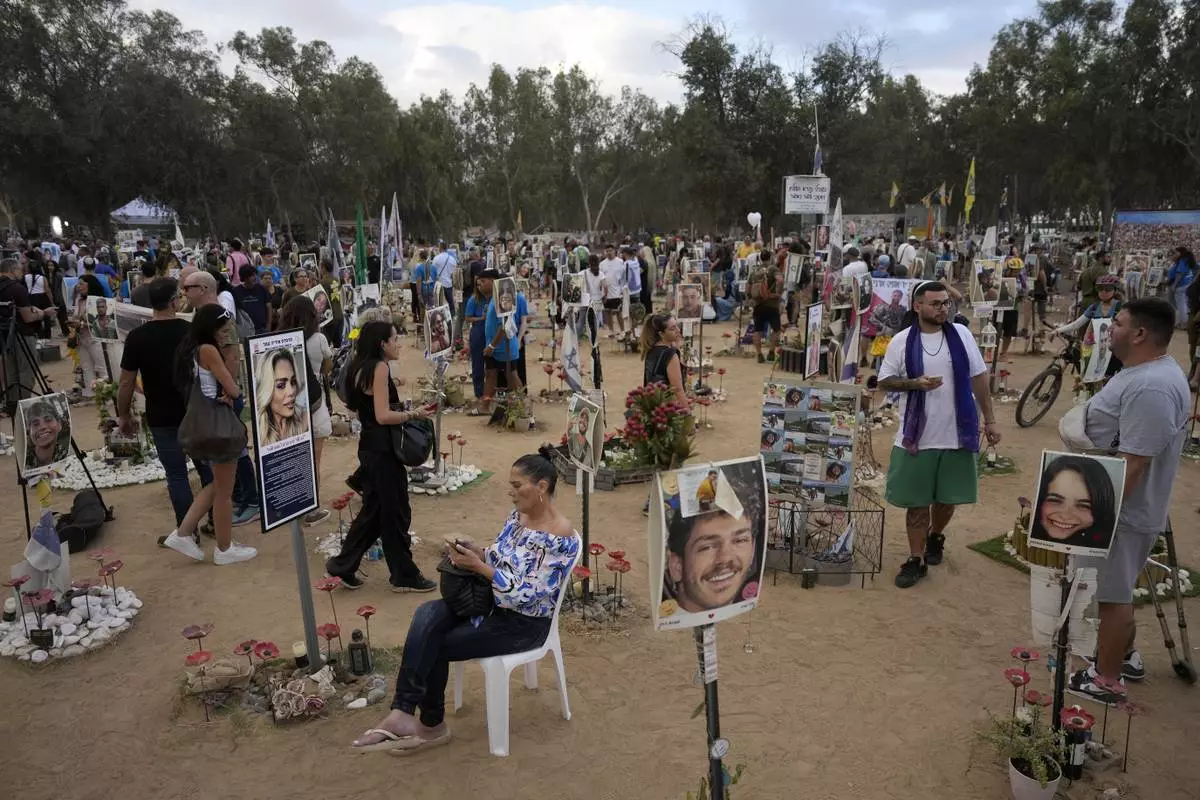
People visit the site of the Nova music festival, where hundreds of revelers were killed and abducted by Hamas and taken into Gaza, on the one-year anniversary of the attack, near Kibbutz Reim, southern Israel, Monday, Oct. 7, 2024. (AP Photo/Ariel Schalit)
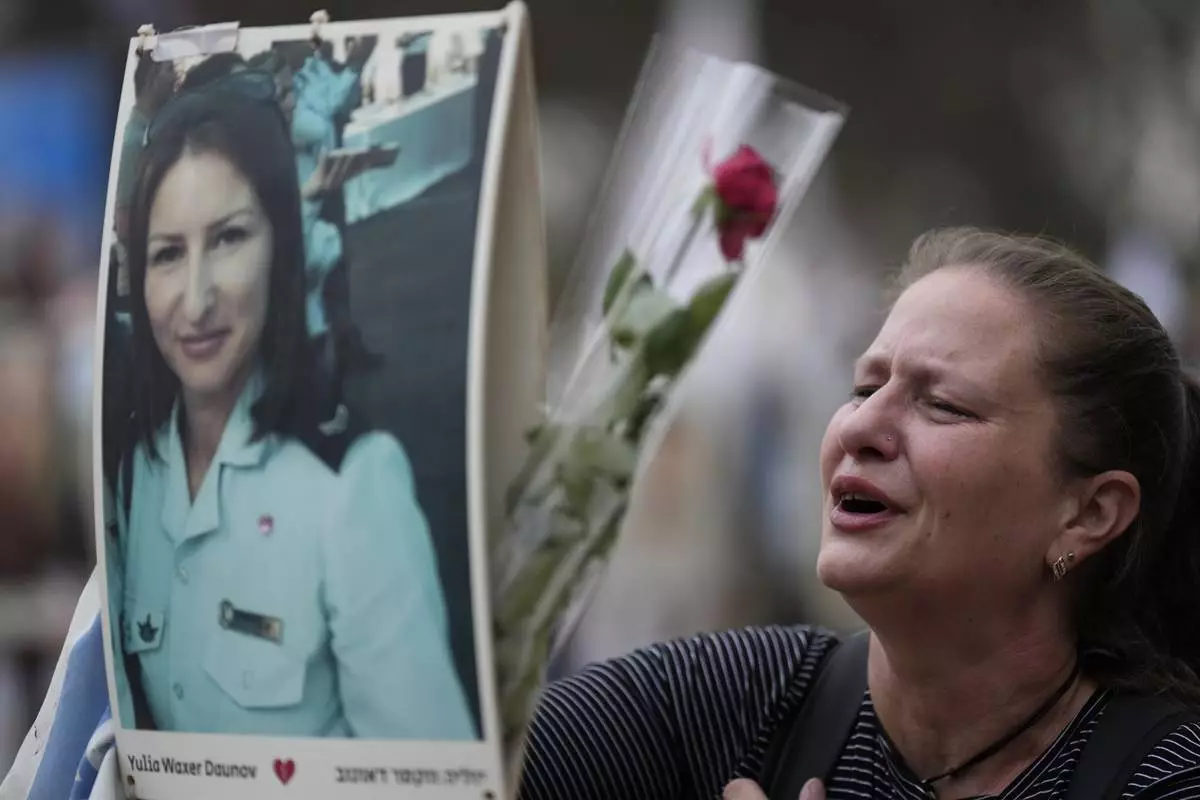
Victoria stands in front a picture of her sister, Yulia Waxer Daunt, as she visits the site of the Nova music festival, where hundreds of revelers were killed and abducted by Hamas and taken into Gaza, on the one-year anniversary of the attack, near Kibbutz Reim, southern Israel, Monday, Oct. 7, 2024. (AP Photo/Ariel Schalit)
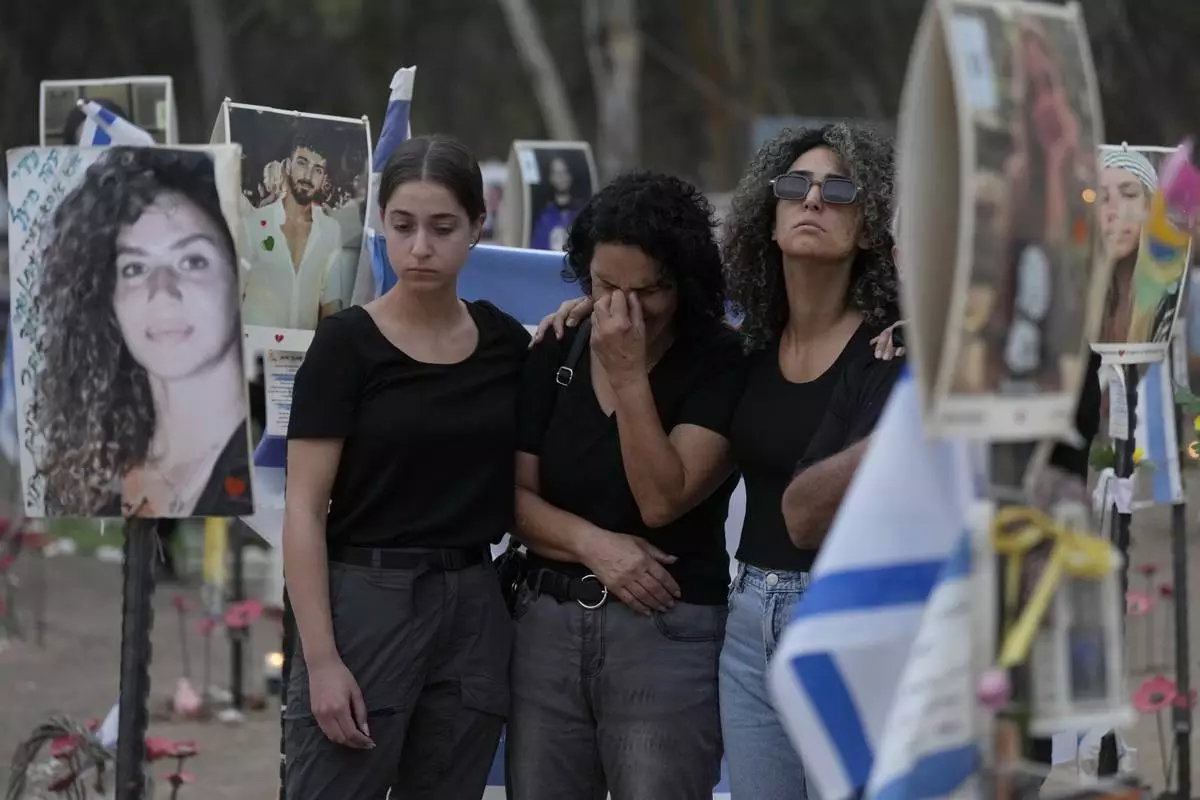
People react during a ceremony at the site of the Nova music festival, where hundreds of revelers were killed and abducted by Hamas and taken into Gaza, on the one-year anniversary of the attack, near Kibbutz Reim, southern Israel, Monday, Oct. 7, 2024. (AP Photo/Ariel Schalit)
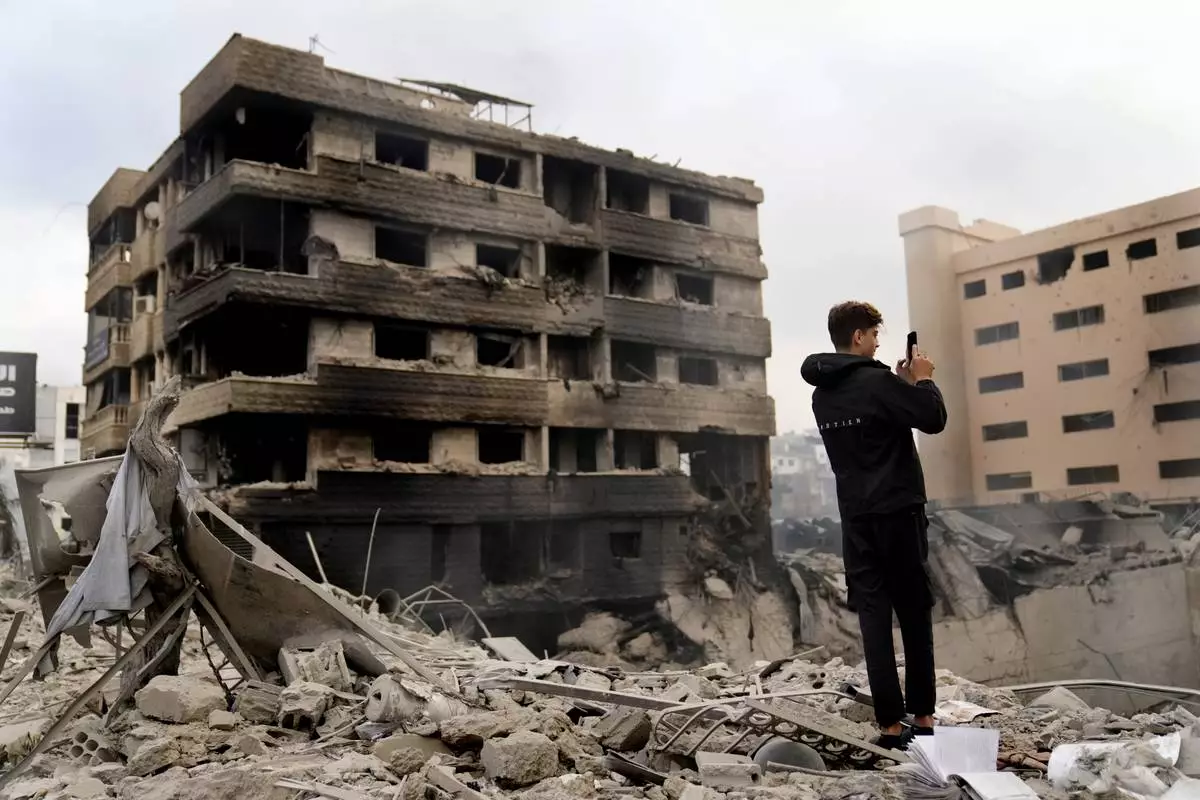
A man takes pictures by his mobile phone of destroyed buildings hit by Israeli airstrikes in Dahiyeh, Beirut, Lebanon, Monday, Oct. 7, 2024. (AP Photo/Hussein Malla)
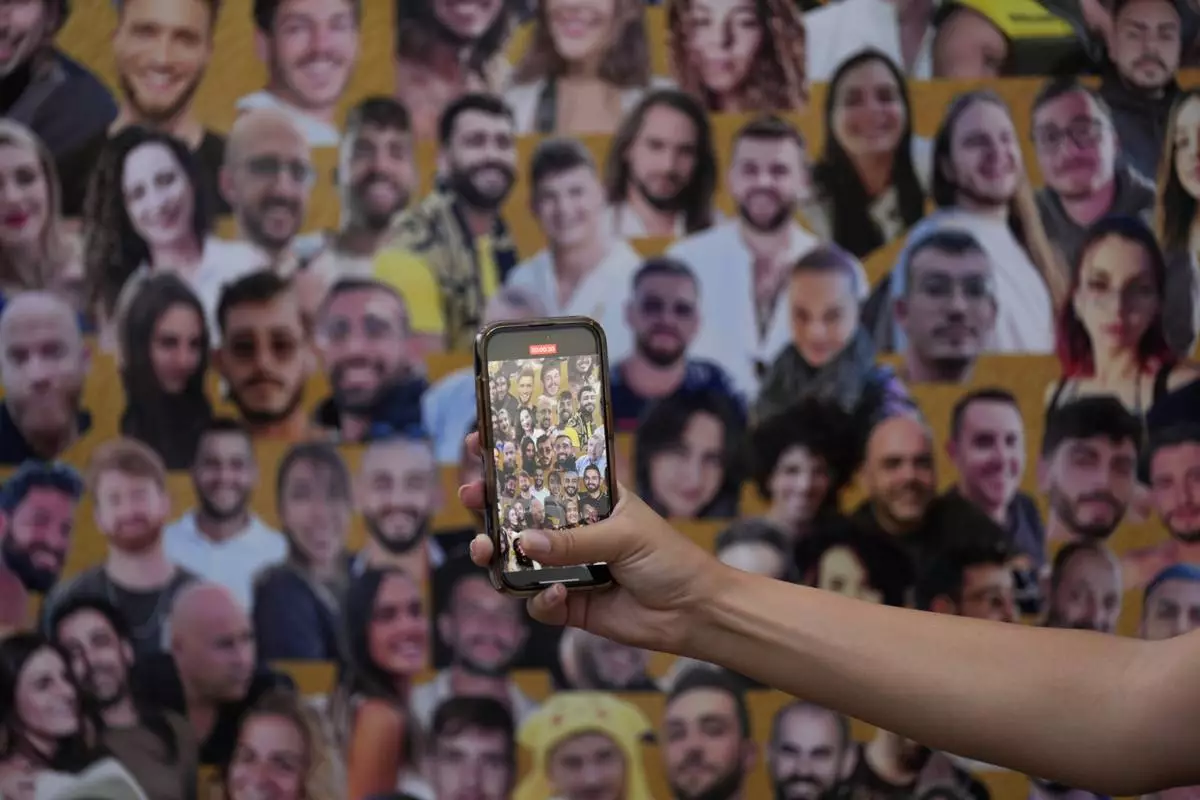
A woman takes photos at a mural with portraits of the victims at the site of the Nova music festival, where hundreds of revelers were killed and abducted by Hamas and taken into Gaza, on the one-year anniversary of the attack, near Kibbutz Reim, southern Israel, Monday, Oct. 7, 2024. (AP Photo/Ariel Schalit)
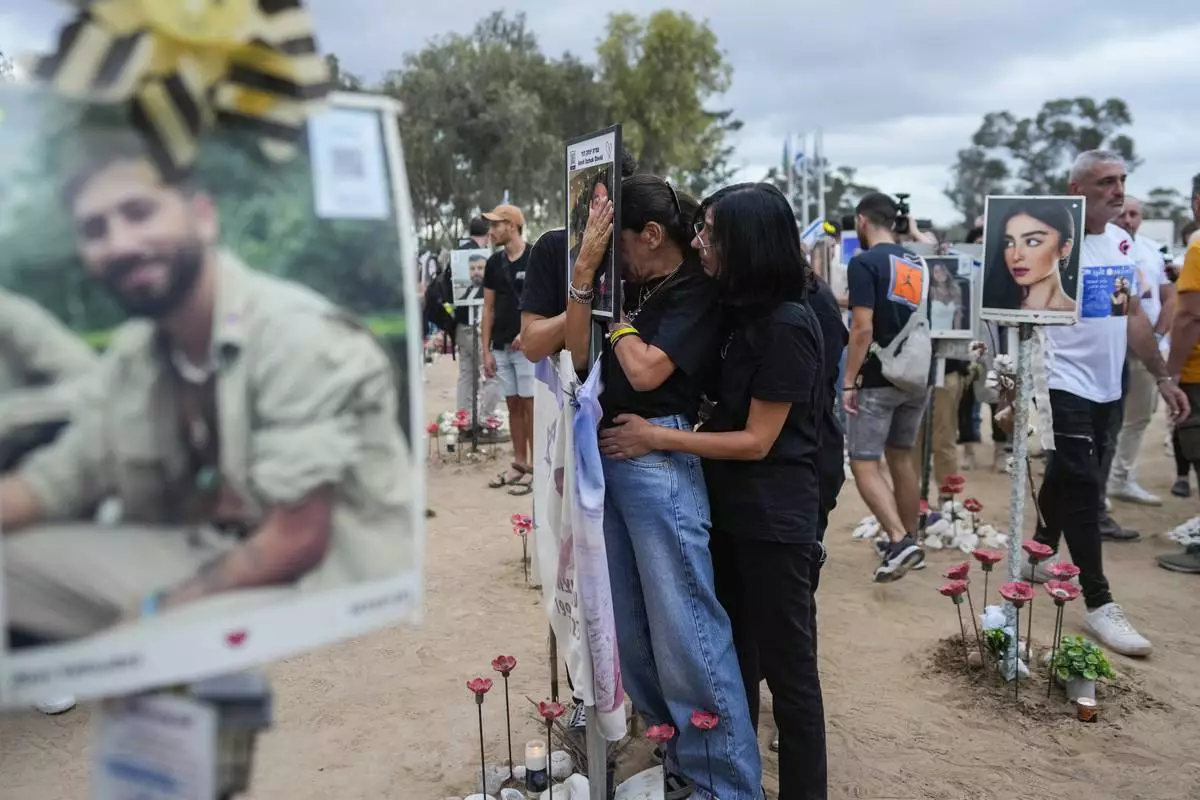
People visit the site of the Nova music festival, where hundreds of revelers were killed and abducted by Hamas and taken into Gaza, on the one-year anniversary of the attack, near Kibbutz Reim, southern Israel, Monday, Oct. 7, 2024. (AP Photo/Ohad Zwigenberg)
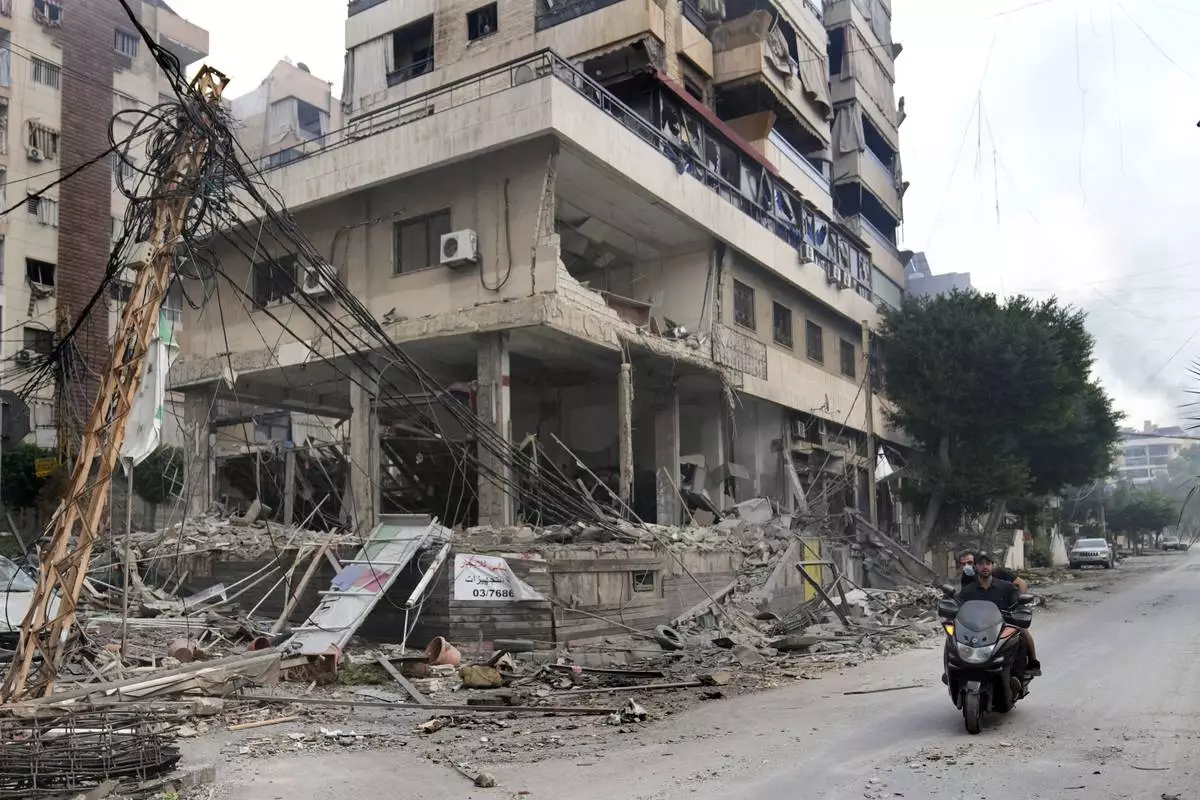
Lebanese men ride a scooter past a damaged building hit by an Israeli airstrike in Dahiyeh, Beirut, Lebanon, Monday, Oct. 7, 2024. (AP Photo/Hussein Malla)














































